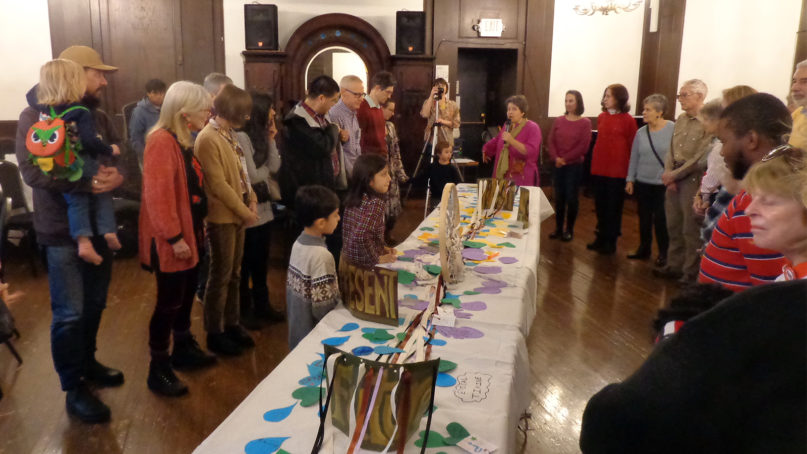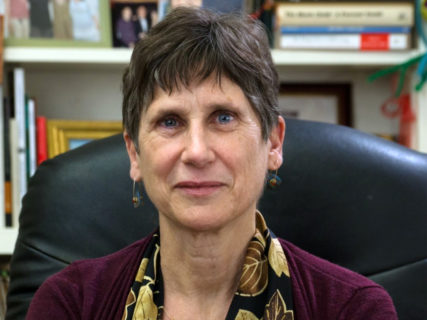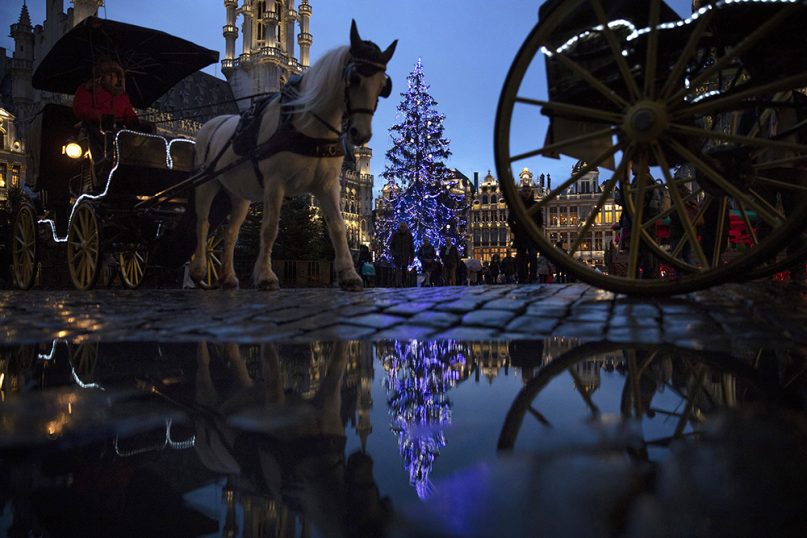
(RNS) — The war on Christmas is over — if you want it, according to Anne Klaeysen, leader emerita of the New York Society for Ethical Culture.
Even the idea that there’s a war on Christmas is “antithetical to the holiday spirit, whether it’s Hanukkah or Christmas or Kwanzaa,” Klaeysen said.
“(The holiday spirit) is about celebrating the human story that we are here on this earth, that we have an opportunity and a responsibility to engage in ethical relationships. I think it’s a message of unity and how we can be more inclusive.”
RELATED: ‘You’ve got to call out evil,’ says pastor of church with Nativity scene separated in cages
During the holiday season, many ethical humanist communities gather to celebrate the values that those wintertime holidays share, according to the humanist leader.
Ethical Humanism, or Ethical Culture, emphasizes human goodness and building ethical relationships with each other and with the earth. Humanist winter festivals are different for each community.

People participate in The New York Society for Ethical Culture’s Winter Festival. Photo courtesy of The New York Society for Ethical Culture.
Last weekend, Ethical NYC reflected on humans’ relationship with nature at its regular Sunday Platform service.
And Sunday (Dec. 22), the Riverdale-Yonkers Society for Ethical Culture gathered for a potluck in the Bronx to share winter songs, a story about festivals around the world and other holiday-themed crafts and activities.
For Klaeysen, who was raised Catholic, and her husband, who was raised Jewish, the holidays ask, “How do we make the circle even bigger? How do we include more people?”
“In that circle, we’re celebrating all the different stories. You know, we’re not denying anyone their own story, but rather all of it together just makes it a more joyous affair,” she said.
Klaeysen talked to Religion News Service about how humanists celebrate the holidays, what humanistic messages people of any faith or no faith can take from the Christmas story and how the holidays can unite, rather than further divide, the country at a time when impeachment proceedings are underway, a presidential election is looming and tension is running high over any number of social issues.
This interview has been edited for length and clarity.
How do humanists celebrate the holidays?
Around this time of year, we have the winter solstice and winter festivals — winter celebrations that are intergenerational, that are open to all faiths. We do a lot of storytelling. We do a lot of singing and music making, bringing nature into the room. It’s always a celebration of what our values are, and those are the core values I think everyone celebrates. So that’s peace, love, joy, hope, giving, merrymaking, singing.

Anne Klaeysen. Photo courtesy of The New York Society for Ethical Culture
Each one of the societies does it in a different way and usually does it differently each year. One of them that was my favorite is we took a story called “Frederick” (by Leo Lionni), and we acted this out last year. “While other field mice are stockpiling food for the winter, Frederick gathers rays from the sun, a rainbow of colors and marvelous words.” And although he appears to be lazy, he helps the other mice remember the warmth of the rays of the sun, all the colors and the poetry. It’s just a lovely story. And so what’s kind of cool about it is because it’s so intergenerational, the adults can get kind of silly, and the children in different ways were the rays of the sun and the colors of the rainbow. You can’t imagine all the laughter and the smiles.
Of course, food plays a very important role in this as well. I remember one year I brought in a bunch of gingerbread cookies that I had baked, and so we had different stations where people could do arts and crafts, and one of those stations was decorating the cookies. And so, whether it’s arts and crafts or baking or song or storytelling, it’s just a way to really come together and enjoy this time.
Other traditions will celebrate the nativity and the birth of a child or, at Hanukkah, the miracles, the lights that keep going or Kwanzaa, all these wonderful values. It gets back, again, to the humanism story of humanity — that we can celebrate and revere the stories and narratives of old, but we don’t stop growing, and we find hidden treasures and stories, and we create new holidays and new stories.
We generally think of Christmas as a Christian holiday. It’s when Christians celebrate the birth of Jesus. You don’t think Christians have a monopoly on Christmas. Why is that?
Obviously, the majority of people (in the U.S.) still identify as Christian, and that’s a very powerful narrative. But we shouldn’t forget there are other powerful narratives and have always been. And so I think this can be a time where adults can introduce children to those other narratives.
One of the things that my children enjoyed most about growing up in the Brooklyn Society was that part of the ethics for children program was learning about other traditions and other religions. So they took field trips to churches, to mosques, to Hindu temples, to synagogues.
That doesn’t mean that there’s a war on Christmas just because other narratives exist. It just means we can highlight them and recognize they exist as well. I think it’s a wonderful learning experience for children to know there are other traditions and also to learn how many of our values coincide, that there’s a more common ground than not.
How can Christians include more people at this time of year?
They sort of have to want to, first of all. One of the problems, I think, for Christians may be if they’re opening their doors in order to teach people about who they are and what they’re all about. What if you open your doors to say, bring who you are and all you are in with you? That’s a different invitation than inviting somebody in to say “learn about us.” I think that’s where ethical culture and humanism differs in as much as we say we’re open to learning about who you are as well.
That being said, I know many people who will go to churches around this time of year because they love singing the “Messiah,” and they love the carols, and they love the candle lighting, and so I’m not suggesting that Christians should be anything but who they are because people love that. I think each congregation needs to decide for itself what it wants to do and how it wants to celebrate.

Coachmen drive horse-drawn carriages as people walk near a Christmas tree placed at the Grand Square in downtown Brussels, Belgium, on Dec. 20, 2018. (AP Photo/Francisco Seco)
What humanistic meanings do you take from the Christmas story?
The Christmas story, I think, can be interpreted as being inclusive when you think about the magi, the story of these kings coming from different nations. There’s that sense of offering a gift to the world, a light unto the world. I think the story of Jesus is certainly one of being inclusive because he’s breaking from tradition. I mean, the story of Jesus is one of him saying, OK, we have inherited these particular stories, this particular type of Judaism, but we need to do more. We need to be more. And, of course, there’s the humility of it, being born in a manger and having the shepherds and all the different animals. There is such a wonderful message there about the humility of it and that it reaches out to everyone. I think that’s why it’s such a powerful narrative or powerful story for everybody.
The Hanukkah story is a little trickier because that is a very specific story, but it’s a story of survival and it’s a story of when you’ve lost all hope and you only have oil enough for one night and then it lasts for eight days. That’s a wonderful story of survival — that there’s conflict and yet we overcome that somehow.
And then Kwanzaa being that creative, cultural holiday is the one that just looks at all the different values and says to African Americans, “We’re important. We count. Our values are important.”
None of these stories should be limited to Jews or Christians or African Americans because there are very inclusive messages in there if we look for them and if we highlight them for one another.
Why are those messages relevant at a time when Americans are so divided?
We’ve talked about this a lot since the election at our ethical societies, about how we can be more open and loving and caring and forgiving of people who hold different positions than we do. And it’s so difficult because we’re speaking about core values.
I’m sure you’ve seen the news about the church that decided to display its nativity scene by putting (Mary, Joseph and baby Jesus) in separate cages and what a powerful message that church made. I mean, do we call a truce at this time of year and say, we’re just going to forget about all of this and celebrate? I don’t have an easy answer for you. I really don’t, because I think it’s important that we do take this time of year to do like that church did and to say that, yes, it’s a story that reverberates today.
In each one of these separate traditions, a search of one’s conscience should be going on. Let’s take a look at those narratives and say, how can we apply them to today’s story? In this impeachment, I think we have an obligation to say everyone that we elect has an obligation to be honest, to have integrity, and if they don’t have integrity, we have a responsibility to call them on it. I know it’s divisive. I know it’s going to continue to be divisive, but I think it’s tough to gloss over it and to call a truce when also at the heart of these core values is honesty and integrity.
And so I have no easy answers for you. It’s going to be tough. Thanksgiving was a difficult holiday for many people, and these upcoming holidays are going to be quite the challenge. I hope that people would take the opportunity to say, what are values that we continue to share? If families who disagree could agree to have a conversation, that would be a miracle; the Hanukkah, Christmas, Kwanzaa miracle — to have a respectful, loving conversation. That’s what I would wish for everyone.
